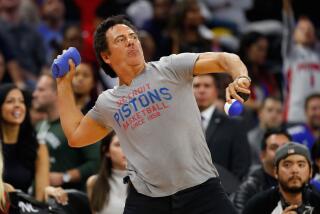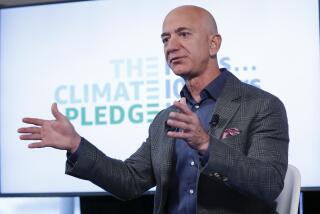Chrysler Takes Defensive Steps as Kerkorian Buys Big Stake
- Share via
DETROIT — Beverly Hills billionaire Kirk Kerkorian has quietly bought 9.8% of the stock in Chrysler Corp., and while the financier insisted that his intentions were friendly, the No. 3 auto maker scrambled Friday to tighten its anti-takeover measures in response.
Kerkorian, a deal maker who pocketed $967 million from November’s sale of entertainment giant MGM/UA Communications Corp., described the $272 million he spent for the Chrysler shares as an investment prompted by his “high regard” for Chairman Lee A. Iacocca.
“When I met him, I got interested at the time,” Kerkorian said in a telephone interview, telling how he first encountered Iacocca more than a year ago at a Florida race track. “I was impressed.”
But Chrysler officials said Kerkorian refused to sign a stand-still agreement at a Dec. 7 meeting with Iacocca. It was that refusal which prompted Chrysler to lower the trigger for its anti-takeover “poison pill” to 10% from 20% ownership of its common shares. Under the provision, other shareholders would be able to buy shares at less-than-market value, making a hostile takeover more difficult and expensive.
Chrysler said the change would protect shareholders “if someone should seek to obtain a position of control or substantial influence over Chrysler.”
Kerkorian and his investment banker, Michael Tennebaum, of Bear Stearns’ office in Beverly Hills, voiced dismay over Chrysler’s response and said the company misread the reclusive financier’s intentions.
“Some time ago, Kirk came to me and said he wanted to buy Chrysler stock, because he had huge admiration for Iacocca,” said Tennebaum, vice chairman of investment banking. “He is 100% supportive of management. He’s sad about the reaction.”
Kerkorian’s Tracinda Corp. said in a statement late Friday: “It is hard for us to see how the (poison-pill actions) are in the best interests of all shareholders.”
Sources close to Kerkorian said shareholder lawsuits were being prepared late Friday to overturn the action of Chrysler’s board. The company said it hadn’t been notified of any court actions.
But Chrysler spokesman Steve Harris said Kerkorian shouldn’t be concerned if, as he told Iacocca at their Dec. 7 meeting, he doesn’t intend to boost his ownership above 10%.
“If he meant that,” added auto analyst Maryann Keller of Furman, Selz, “it seems to me he would have signed the stand-still agreement.”
Kerkorian’s Chrysler purchases baffled investment analysts who follow the car maker. Keller and others described the notion of a deal maker such as Kerkorian taking over an auto company as senseless. Nor is Chrysler seen as a good short-term investment.
Wall Street yawned at the disclosures; Chrysler shares closed unchanged Friday at $12.25 a share.
Chrysler’s Harris said the company requested a meeting with the investor after finding out about his purchases. Kerkorian, Iacocca and Robert S. Miller, Chrysler’s vice-chairman and chief financial officer, met last week at company offices in New York.
Kerkorian told the Chrysler executives he then held less than 5% of Chrysler’s 222 million shares of common stock and intended to stay below 10%, Harris said. But he refused to put the pledge in writing.
Despite Kerkorian’s protests, Iacocca has reason to be skeptical. Kerkorian has a long track record as a deal maker, dating to his hostile purchase in 1969 of 37% of what was then known as Metro-Goldwyn-Mayer Inc. for $82 million.
Over the next 20 years, he boosted his stake in the studio to more than 80% and put MGM and its successor companies through a bewildering maze of restructurings, mergers, asset sales and executive changes.
Amid the instability, MGM remained a weak sister among the Hollywood companies. But Kerkorian insisted that investors who bet with him were rarely disappointed. Through a publicist, he boasted in recent years that an investor who bought $100 of MGM stock in 1975 would have made $2,687 in 1986.
He made moves against other studios--first Columbia Pictures in 1979 and then Walt Disney Co. in 1984--but neither deal jelled.
Kerkorian’s involvement with what came to be called MGM/UA Communications Co. ended only six weeks ago, when Pathe Communications bought the company for about $1.3 billion.
Outside of MGM, he has shown little interest in long-term investments.
“The longer you stay, the more odds work against you,” Kerkorian has been quoted as saying.
Chrysler requires a long view, analysts agree. The weakest of the three U.S.-based auto companies, Chrysler is expected to finish 1990 in the red. But its losses are not expected to be as deep as those at General Motors Corp.
Analyst Keller credited Chrysler with being better prepared for the looming recession than GM or Ford, and says there is nothing a takeover artist can do to improve the company or its management.
All the domestic auto makers are suffering from competition by Japanese-owned auto plants built in this country in the last few years. More recently, the economic downturn has sent auto sales and production into a tailspin.
“A takeover of Chrysler is absurd, because the takeover itself would severely leverage the company,” said Keller. “How anyone could expect an auto maker to compete in what is an unprofitable environment by increasing its fixed costs is beyond me. Is he greenmailing? Terrific. A great thing to do to an auto company that is trying hard to survive.”
Nor does Chrysler have assets that could be readily sold off by a corporate raider without damaging the car and truck business. Its principal subsidiaries are rental car companies and a big finance unit, both of which are closely tied to the sales of the company’s vehicles.
Some observers speculated that Kerkorian might view Chrysler as a merger candidate and figure to make money on its stock that way. But Keller doesn’t take Chrysler’s oft-speculated merger prospects seriously.
Kerkorian’s purchases make him Chrysler’s largest single shareholder, ahead of the Wellington Group and Sanford C. Bernstein, both of New York, and the State of Michigan pension fund.
Times staff writers Robert E. Dallos in New York and Michael Cieply in Los Angeles contributed to this story.
KERKORIAN’S BUSINESS DEALINGS Made $996 million from the $1.36-billion sale of MGM/UA Communications Corp. last month.
Owns 81% of MGM Grand Inc. which includes MGM Grand Airlines and two Las Vegas hotels: the Desert Inn and the Marina. MGM Grand Inc. reported revenues of $192 million in 1989.
Has announced plans to build the world’s largest casino-hotel in Las Vegas at an estimated cost of $800 million. The resort would include a gold lion standing 109 feet tall, a 2.5-acre gaming floor, a 50-passenger elevator, a theme park and some 5,000 hotel rooms.
CHRYSLER AT A GLANCE Chrysler Corp. is the nation’s No. 3 auto maker. It owns a finance company and Thrifty Rent-a-Car System.
Year ended Dec. 31 1989 1988 1987 Sales (millions) $34,922 $35,473 $26,277 Net income (millions) 315 1,050 1,290
Assets: $51,038,000,000 Employees: 122,000 Shares outstanding: 225,400,000 12-month price range: 9 1/8--20 3/8 Friday close (NYSE): 12 1/4 (unchanged)
More to Read
Inside the business of entertainment
The Wide Shot brings you news, analysis and insights on everything from streaming wars to production — and what it all means for the future.
You may occasionally receive promotional content from the Los Angeles Times.










